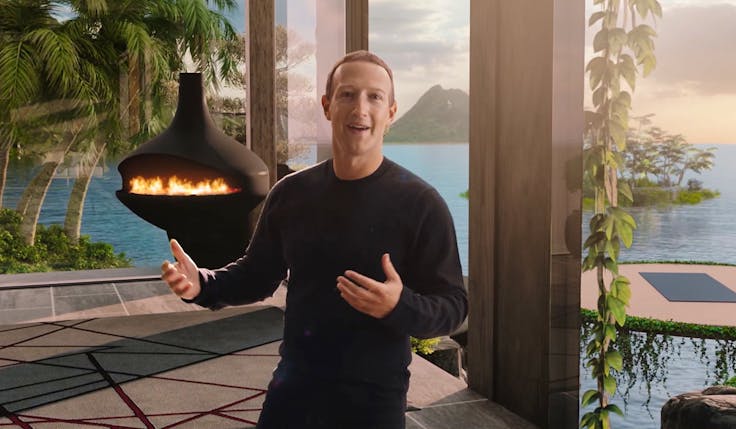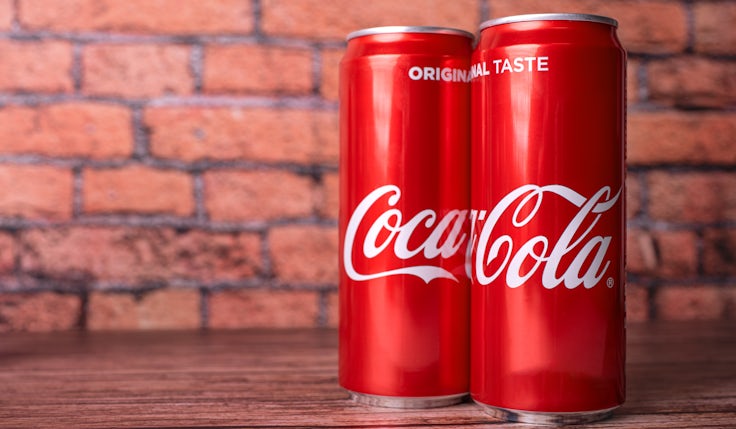Does Facebook’s corporate rebrand to ‘Meta’ prove the future is ‘beyond’ it?
Our marketing columnist stayed up late in Tasmania and put his headset on for the Facebook Connect VR conference. But he came away unimpressed with the branding revelations that followed.

By now you probably know about the biggest branding move of 2021 and possibly the last few years. Facebook will become Meta, a new company that will encompass all the various existing social media apps from the company formerly known as Facebook and all the future projects that it will subsequently develop.
I must confess that I did not feel very ‘meta’ sitting in my underpants for 80 minutes watching Zuckerberg and his coterie of senior developers looking suitably future-struck, while wandering around various rendered backdrops. It was very boring. I lost count of the perky, 30-something people who popped up for a casual, completely scripted, chat with “Zuck” about the potential of the metaverse. And I had to sit through 76 minutes of this flaccid future porn before we reached the reason I was there; the announcement of a new brand for Facebook.
A lot of people will bang on today about ‘rebranding’ and its various perils. But they are largely missing the point. Yes, Facebook the company is changing its name to Meta – but only at the corporate level. You will remember that, less than two years ago, Facebook became the corporate brand for its suite of social media apps that includes Instagram, WhatsApp and Facebook (the product brand). Well now Zuckerberg is changing that corporate brand name to Meta and adding a swanky blue infinity loop logo to boot.
Moving closer to Facebook is dangerous for Instagram’s brand
While the name is somewhat significant, the real news is in the brand architecture implications for Facebook – sorry, Meta – going forward. Facebook now becomes simply one of the many brands within a company called Meta that is now firmly focused on what Zuckerberg called “the next chapter”. Meta is a proper house of brands with a large, and one might expect growing, suite of disconnected brands within it.
As usual with brand architecture moves like this, what appears relatively cosmetic actually reveals much more of the strategic direction of a company. The move to Meta reflects two very different interpretations of the Greek word, which means ‘beyond’. Zuckerberg’s new brand strategy is designed to take his company beyond the current reputational challenges that it now faces. And it is also designed to set up the company for the future digital environments that will exist beyond the current context of app-based software.
Beyond the current problems
Meta helps with the first challenge of going beyond the existing troubles by providing much-needed perceptual distance between Facebook and its sister brands, and the holding company that owns them all. With its dodgy brand image and recurring reputational missteps, the decision to name the whole company Facebook was stupid back in 2019. And it has not got any smarter since then.
Corporate brands are important on any number of levels, from supplier relationships to employer branding. And all of these levels will have been impacted by Facebook’s disastrous errors over the past few years. It was almost impossible not to watch yesterday’s announcement, and the cavalcade of perky executives that appeared in it, without imagining these people having to go to a dinner party in the Valley and tell people that they worked for Facebook – then crying outside with a glass of chardonnay in their hand at the reaction.
More generally, the heat on Facebook is set to worsen. But if that heat focuses on only one brand of many within the Meta company, Zuckerberg will hope that the rest of his empire will be cut a little bit more slack. He may even have plans to appoint someone to run Facebook and handle this heat, while he heads up to the green, un-shat-upon fields of Meta. That would be a mistake, but it would not stop him making it.
Meta will also take some of the pressure off the higher-potential brands, like Instagram, that were done very few favours when they were squeezed closer to Facebook in both platform and branding senses back in 2019. Zuckerberg noted yesterday that users will no longer need to access most of the company’s services using their Facebook ID and password, suggesting that the future is about distance, not proximity, from the founding brand of the group.
Beyond the current world
The other rationale for Meta is a focus on the future. Zuckerberg repeatedly referred to the metaverse as the next chapter for his company and for the internet. That means new, high-potential opportunities. But it also means that the current world of apps, screens and early 21st-century tech is likely to be superseded and replaced by the metaverse. If he does not move now, he becomes associated with the past and his brand will die with it.
Zuckerberg will be well aware that seeing the future and being part of it as it unfolds are two very different things. The strategic odds are certainly against him. The history of disruption tells us that most companies that dominate the current chapter are usually killed off early in the subsequent section of the book. Kodak famously missed out on digital imaging. IBM completely missed out on the PC revolution. And, in an infamous moment of immolation, Nokia completely failed to benefit from mobile internet despite its early domination of smartphones.
The reasons for these failures are complex and nebulous. But a short summary might point to both an external issue (the brand becomes synonymous with the wrong things in the eyes of customers) and an internal one (the dependencies and competencies that a company developed to win big in chapter one ensure that same company is entirely unsuited to chapter two and the changes it ushers in).
There is already a sense that, no matter how much money and how many minutes Zuckerberg throws at the metaverse, this fate awaits him too. He talked repeatedly yesterday about a vision of the metaverse that was more “open” and “fair” with “people at the centre” of the technology. I wonder if, as he said those words, it occurred to him that the fit between this vision and the company he runs are so far apart as to be insurmountable?
Similarly, as he described the egalitarian creator economy that will build the metaverse, did he worry about the so-far unknown Abdul or Chyou who will one day supplant him and his empire?

I suspect none of this is clear to Zuckerberg. He appears almost completely ignorant of the degree to which his brands are perceptually damaged. He spoke at one point of the DNA of Facebook being “connecting people”, but seemed entirely unaware that the other genes in that genetic sequence include ‘big’, ‘bad for you’, ‘controlling’ and ‘untrustworthy’. These are awful associations at the best of times, but fatal when one intends to bet the farm on being part of a new open, co-created universe.
And Zuckerberg has to take some of the blame for this directly. He has been a branding problem for Facebook for a decade. And he will be the biggest branding issue for Meta as of today. His attempt to be relaxed, self-effacing and, well, human was entirely unconvincing yesterday. There was not a single moment in which any form of natural, social engagement occurred. It was bad.
Much of this is not Zuckerberg’s fault. We all have our strengths and weaknesses. But his grand mistake is to miss his limitations and the fact that he is the wrong person to be the spokesperson for his company. Steve Jobs was a visionary and a rebel and the epitome of Apple. But there are many ways to lead.
Zuckerberg should look to CEOs like LVMH’s Bernard Arnault, who run everything but do so without much external attention or impact on consumers. Zuckerberg needs to be quiet from now on. Partly because he leads a house of brands and, in that configuration, the holding company usually stays quiet and lets its brands do the separate talking. And partly because he is the antithesis of the brand values he aspires to communicate, and the future world he so desperately wants to dominate.
The creation of Meta and the reorganisation into a proper house of brands will probably not help Facebook to evade its current woes, or triumph in the metaverse that awaits us a decade from now. Indeed, it was a third implication of the word Meta – that events and opportunities are beyond Facebook – that struck me most after today’s session.
I worked for Ericsson at the arse end of the 20th century and I remember all these glossy future videos from Nokia and Sony Ericsson that had people on boats using smartphones to talk to friends in other countries at the touch of a button. We ooh-ed and ahh-ed at these visions but, to their credit, these expensive movies actually predicted the future with remarkable accuracy. Today, the only thing missing is Sony Ericsson or Nokia. The future, like history, often repeats itself.







